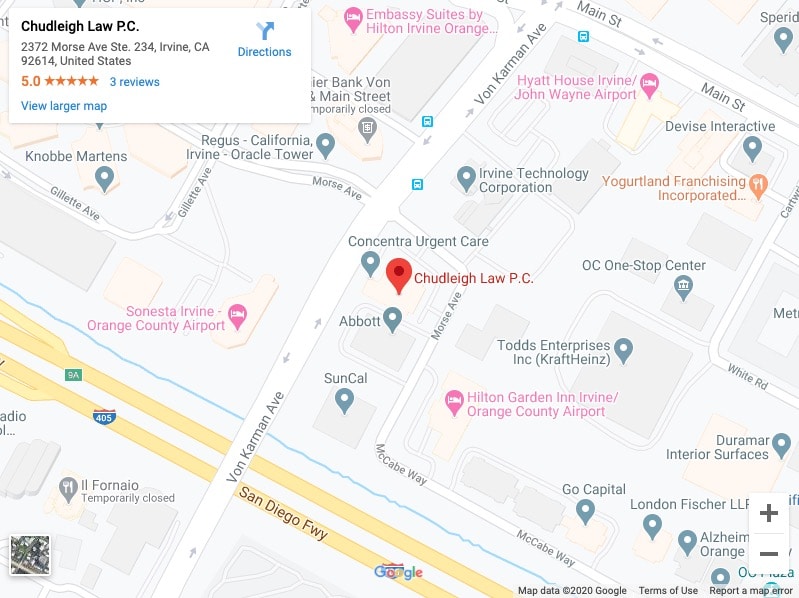Experience. Integrity. Results.

Experience. Integrity. Results.

Business Lawyer Orange County
Every business begins with the hope that it will reach its full potential. Your Orange County business lawyer can play an integral role in your companies success.
Every type and size of business differs in the way it operates. An experienced business attorney helps in several ways:
- Structuring ventures to encourage success
- Drafting clear agreements
- Negotiating favorable terms
- Implementing processes and safeguards to prevent future disputes
- Solving business disputes that do arise
The attorney performs these and other services in the most cost-effective manner. They craft their services to meet the unique needs of the business. From start-ups to Fortune 500 companies, each business requires a custom legal strategy to succeed, which begins with choosing the right business structure.
Entity Formation: Choose Your Business Structure
The business structure you choose determines the laws that apply to every aspect of how you operate. It dictates how you pay your employees and your taxes. It also determines the risk to your personal assets. The ideal business structure creates a balance between legal protections and risk.
1. Limited Liability Company (LLC)
An LLC offers excellent risk protection from personal liability. It blends the benefits of a corporation with those of the partnership business structures. If the company ends up in bankruptcy or lawsuits, your personal assets aren’t at risk. A failing business won’t put your home, vehicle, or financial assets at risk.
The law allows profits and losses from an LLC business to pass through to your personal income without applying corporate taxes. However, the law also considers you as self-employed. You must pay self-employment tax towards Social Security and Medicare.
The laws that apply to LLCs also vary by state. Some have limitations on the lifetime of LLCs. Others require the business to be dissolved before re-forming with new membership under some conditions.
An LLC might be a good choice if you have significant personal assets. Medium to high-risk business owners often choose an LLC structure. It also allows them to pay lower taxes than with corporations. Mr. Daniel Chudleigh of Chudleigh Law can help you decide if an LLC is the right structure for your business. He is a business lawyer in Orange County with in-depth knowledge and experience in California business law.
How to Start an LLC
You must file the paperwork with the state where your LLC is located. While the process varies from state-to-state, some steps apply in any case.
– Start with a Great Name
In most states, you’re limited to using one name for all of your business locations. You can’t have an LLC in one city and an Inc in another. Your state might also restrict you from using certain names. Your business lawyer in Orange Country will advise you on the guidelines.
Research other businesses in your area online for name availability. You need a unique name that sets your business apart. Even a name that is similar can lead to confusion. It could result in a loss of business or trademark infringement problems. For example, ‘Joe’s Pizza’ and ‘Joey’s Pizza’ only have one letter that differs. It would be easy for people to mix them up when placing an order.
It’s also a good idea to play around with domain names. Ideally, your domain name will make it easier for customers to find you when they do a general search.
If the LLC name you want is available now, it might be gone by the time you file your documents. Reserving it usually costs a small fee. By reserving it, it’ll be ready when you need it later. Check with your business attorney to learn the process and time periods in your state.
– Choose a Registered Agent
Some states call them “statutory agents” but almost every state requires them. You must name a registered agent when you apply. This person agrees to receive subpoenas, lawsuits, and other official documents on behalf of your LLC. The agent then distributes them to the right people.
In most states, the agent must be over the age of 18 years and a state resident. Another option is to hire a registered agent through a company that charges a fee for their services.
– Create an LLC Operating Agreement
This is a guide that explains how your business will run. Some of the things detailed in the agreement include:
- Ownership Interests
- Allocation of Profits and Losses
- Members’ Voting Rights
- The Governing of the LLC
- How the Company Will Be Dissolved In Case It Goes Out of Business
- Members’ Rights in the Event of One’s Death or Exit from the Business
The operating agreement probably isn’t required by your state. It serves an important guideline that defines your rights and responsibilities. It also reduces the potential for future disagreements. That means less hassle for you and better protection for your business.
– File the Required Articles of Organization
The procedure for this also varies from state-to-state. Usually, you need to file the name and address of your business. You’ll also include the length of existence (if not perpetual), info about your registered agent, and the purpose of your LLC. If you’re the person forming the LLC, you’re probably the one who needs to sign it.
The articles of organization usually go to the Secretary of State. Check with your state on where to file and the cost of the filing fee.
– Wait for Your Certificate or Documentation of Approval
Once you file the LLC documents, wait to receive the certificate or another document of approval. Next, get your tax ID number and business licenses. Now is the time for setting up a business bank account.
– Register to Operate a Business in Other States if Needed
Today’s businesses can be any size. Some operate on a small, local scale while others operate across states or even globally. If your business will operate in other states, you might need to register in those states as well. The process is similar to filing as an LLC in your state. One difference is that you’ll need a registered agent in each state where you operate.
Starting and operating an LLC is usually a fairly simple option for small business owners. It’s essential to fill out all of the paperwork properly for the appropriate state. Get the help of a small business lawyer at the beginning of the process and spend your time setting up a business structure wisely.
2. C Corps
A C corp, or C corporation, is a more complex business structure. Business owners choosing this option incorporate under Subchapter C of Chapter 1 of the Internal Revenue Code. In simpler terms, a C corp is a legal entity that is owned by shareholders. Classification as a C corp protects individual shareholders for personal liability. The state where the C corp is formed governs the business.
How to Start a C Corp
Some steps of starting a C corp are like starting an LLC. These steps include choosing a legal name and reserving it if allowed. Also, find out the limit for how long the Secretary of State reserves the name. You must complete and submit your articles of incorporation before that time.
– File Articles of Incorporation
Some business owners choose to take this step on their own. You should talk with a business lawyer in Orange County to ensure you get it right. Most states require you to provide a list of names and addresses for your initial officers and directors.
– Issue Stock Certificates to the Initial Stockholders
Once the Secretary of State notifies you that they accept your articles of incorporation, issue stock certificates to the initial shareholders.
– Apply for a Business License and Permits
Find out which licenses and permits your state requires. Also, determine whether your business requires federal licenses or permits. File for all those required by your business.
– File for an Employer Identification Number
Either file and submit a Form SS-4 or apply online at the IRS official website. You must obtain an employer identification number (EIN) even if you don’t plan to hire employees. The EIN serves as a corporation’s tax ID number. You will need it for several transactions such as obtaining financing or filing taxes. Applying online is the fast option. You can receive an EIN in just a few minutes.
– Apply for Additional ID Numbers
Find out what state and local government agencies require additional ID numbers. These requirements vary both by state and by jurisdiction. Applying for all the required numbers will prevent you from having penalties imposed. This is another area where your business lawyer in Orange County can offer vital legal advice.
3. S Corps
An S corp is another business structure that offers limited personal liability. It files under Chapter 1, Sub-chapter S of the Internal Revenue Code. It is also taxed by the federal government. One fact that makes an S corp appealing is that taxes are less than what you’ll see with other types of corporations. An S corp lets you avoid the double taxation of a C corp. Some benefits include allowing some profits and losses to pass through to your personal income without being subject to corporate tax rates. You can file for an LLC S Corp, but it isn’t recommended for small businesses.
You should know the laws regarding S corps in your state. Some don’t acknowledge S corps and treat them as C corps. Also, an S corp must file with the IRS for S corp status. Simply registering with the state isn’t enough.
There are also laws that limit the number and citizenship of shareholders. You can’t have more than 100 shareholders and each must be a U.S. Citizen. With an S corp, you must still follow strict filing and operational processes that apply to C corps. Also like C corps, S corps have an independent life. You can continue doing business as usual if a shareholder leaves or sells their shares. Ask your small business lawyer if you meet the criteria to file as an S corp.
S Corporation (S Corp) Vs Limited Liability Company (LLC)
S corps and LLCs have many similarities although each has unique terminology. With a corporation, shareholders are the owners. In an LLC, the members are the owners. Officers are the people who manage the operations of a corporation. Managers manage an LLC. The profits in a corporation are called dividends. In an LLC, they remain as profits.
The documents forming the corporation are articles of incorporation and bylaws. In an LLC, it is an operating agreement. Shareholders own various numbers of shares. The dividends are distributed according to how many shares the shareholders own. In an LLC, the profits are passed on to the members.
Both business structures fall under state law. For IRS purposes, the business is first considered a C corp. You must file an IRS Form 2553 to change it to an S corp.
S corps are usually the choice of smaller businesses. Large corporations or those with large amounts of start-up capital do not usually qualify as an S corp. This is often due to one of three reasons:
- The business will have more than the limit of 100 shareholders
- Issuing more than one class of stock
- Offering shares of stock to the general public
Some states require LLCs to provide a dissolution date. In contrast, corporations are ongoing. LLCs sometimes must end when a member dies, files bankruptcy, or withdrawals.
LLC Vs S Corporation: Which Is the Best Business Structure for You?
A business lawyer in Orange County can help you determine the best choice. Some factors to consider include:
– Limitation of Personal Liability
– Tax Obligations and Processes
– The Complexity of Forming and Operating the Structure
– Related Costs
– Potential for Profit-Sharing
– Transferability of Ownership
Chudleigh Law offers a free consultation to discuss your legal needs. Make the right choice in a business structure that is ideal for your needs.
4. Partnerships
Partnerships are easy to form in the state of California. Your business lawyer in Orange County can help you with the process. He can also explain the two types of partnerships: general partnerships (GPs), and limited liability partnerships (LLPs.) A partnership might last for a specified time or indefinitely.
The first step in forming either type of partnership is to choose a name. You will file the name according to the requirements for the type of partnership you choose.
How to Form a Partnership
Once you choose a name, research it at the California Secretary of State website. This will tell you if it’s available for your LLP. Checking the “business entities” and “name availability” options will take you to “name availability inquiry letter.” You must complete this form online, download and print a hard copy, and mail with the required fee to the address listed on the form.
If you form a GP under any name other than the legal name of one of the partners, the process differs. You must file a fictitious business name in the county where your business is located. The country clerk will provide you with the forms you need to complete. This process prevents other businesses from using the name in your county.
– Draft a Partnership Agreement
While not a legal requirement, the agreement helps prevent conflicts in the future. It should include details on the distribution of profits, adding or removing partners, how the partnership may be dissolved, and other details about the operations.
– Register with the California Secretary of State
GPs aren’t required to file, but it is an option that keeps the business on record with the state. Find the form at the California Secretary of State website. Go to “business programs”, then “business entities, “general partnerships”, and then “statement of partnership authority.”
You will find the fee for LLPs on the same “forms, samples, and fees” page. You must provide information about the type of business you have on the LLP form.
– Apply for a Business License
The type and number of business licenses required depend on your business. In California, you can find information and the appropriate forms at the CalGOLD website. Have your business lawyer in Orange County help you choose the appropriate forms for your business.
– File Your Taxes
It is your responsibility to file your taxes each year with either type of partnership. Submit Form 1065 to the IRS. Also pay the Limited Liability Partnership Annual Tax and file a Form 565 with the state.
5. Sole Proprietorships
A sole proprietorship is the simplest business structure. You are the sole owner and are personally responsible for any debts. Your income and losses are taxed on your personal income tax.
In California, establishing a sole proprietorship doesn’t require any legal documents. Just follow the four simple steps below:
- Choose a name
- File a fictitious business name statement with the county recorder
- Obtain any required licenses, permits, and zoning clearance
- Obtain an Employer Identification Number (EIN)
6. Start a Non Profit
One significant way that a non-profit business differs from other business structures is their tax-exempt status. This type of business is not structured for the sole purpose of making a profit. If you want to start a non-profit, follow these steps:
- Choose a business name
- Incorporate your business
- Apply for tax exemption with the IRS
- Apply for tax exemption with your state
- Draft bylaws for your business
- Appoint directors
- Hold a meeting of the board
- Obtain any required licenses and permits
Talk to your small business lawyer about getting liability protection and tax-exempt status for your new non-profit business.
Business Contracts
Any business structure requires legal agreements and contracts for a variety of purposes. Some of the most common include:
– LLC Operating Agreement – This document allows you to structure financial and working relationships with co-owners. It establishes the percentage of ownership and each member’s rights and responsibilities.
– NDA’s – A non-disclosure agreement protects your business by preventing others from disclosing important information.
– Licensing Agreements – These documents are deals between the owner of a patent, trademark, or brand, and someone who wants to use it.
Non-Compete Contracts – Contracts between an employee and employer prohibiting the employee from entering into competition with them.
Buy Sell Agreement – An agreement among owners of a business that should any of them leave, they will share their ownership amongst the remaining members.
Choosing a business structure is a big decision. It also requires in-depth knowledge of business law. Don’t risk getting any of the details wrong. Contact Chudleigh Law for an experienced business lawyer in Orange County with a reputation for getting results. Making the right choices in the beginning will help make your business a more successful one!
ORANGE COUNTY: Aliso Viejo, Anaheim, Brea, Buena Park, Costa Mesa, Cypress, Dana Point, Fountain Valley, Fullerton, Garden Grove, Huntington Beach, Irvine, La Habra, La Palma, Laguna Beach, Laguna Hills, Laguna Niguel, Laguna Woods, Lake Forest, Los Alamitos, Mission Viejo, Newport Beach, Orange, Placentia, Rancho Santa Margarita, San Clemente, San Juan Capistrano, Santa Ana, Seal Beach, Stanton, Tustin, Villa Park, Westminster, Yorba Linda.
LOS ANGELES COUNTY: Agoura Hills, Alhambra, Arcadia, Artesia, Avalon, Azusa, Baldwin Park, Bell, Bell Gardens, Bellflower, Beverly Hills, Bradbury, Burbank, Calabasas, Carson, Cerritos, Claremont, Commerce, Compton, Covina, Cudahy, Culver City, Diamond Bar, Downey, Duarte, El Monte, El Segundo, Gardenia, Glendale, Glendora, Hawaiian Gardens, Hawthorne, Hermosa Beach, Hidden Hills, Huntington Park, Industry, Inglewood, Irwindale, La Canada, Flintridge, La Habra Heights, La Mirada, La Puente, La Verne, Lakewood, Lancaster, Lawndale, Lomita, Long Beach, Los Angeles, Lynwood, Malibu, Manhattan Beach, Maywood, Monrovia, Montebello, Monterey Park, Norwalk, Palmdale, Palos Verdes Estates, Paramount, Pasadena, Pico Rivera, Pomona, Rancho Palos Verdes, Redondo Beach, Rolling Hills Estates, Rosemead, San Dimas, San Fernando, San Gabriel, San Marino, Santa Clarita, Santa Fe Springs, Santa Monica, Sierra Madre, Signal Hill, South El Monte, South Gate, South Pasadena, Temple City, Torrance, Vernon, Walnut, West Covina, West Hollywood, Westlake Village, Whittier.
SAN DIEGO COUNTY: Carlsbad, Chula Vista, Coronado, Del Mar, El Cajon, Encinitas, Cardiff-by-the-Sea, Leucadia, Olivenhain, Escondido, Imperial Beach, La Mesa, Lemon Grove, National City, Oceanside, Poway, San Diego, San Marcos, Santee, Solana Beach, Vista.
RIVERSIDE COUNTY: Banning, Beaumont, Blythe, Calimesa, Canyon Lake, Cathedral City, Coachella, Corona, Desert Hot Springs, Eastvale, Hemet, Indian Wells, Indio, Jurupa Valley, Lake Elsinore, La Quinta, Menifee, Moreno Valley, Murrieta, Norco, Palm Desert, Palm Springs, Perris, Rancho Mirage, Riverside, San Jacinto, Temecula, Wildomar.
SAN BERNARDINO COUNTY: Adelanto, Apple Valley, Barstow, Big Bear Lake, Chino, Chino Hills, Colton Fontana, Grand Terrace Hesperia, Highland, Loma Linda, Montclair, Needles, Ontario, Rancho Cucamonga, Redlands, Rialto, San Bernardino, Twentynine Palms, Upland, Victorville, Yucaipa, Yucca Valley.
LEGAL AWARDS







Free Consultation
Free Consultation. No Pressure. Talk to an attorney today.
Office Locations
CHUDLEIGH LAW P.C.
410 Broadway Street # 170
Laguna Beach, CA 92651
Telephone: (949) 504-5000
E-mail: info@ChudleighLaw.com
CHUDLEIGH LAW P.C.
2372 Morse Ave., Ste. 234,
Irvine, CA 92614
Telephone: (949) 504-5000
E-mail: info@ChudleighLaw.com



